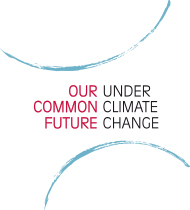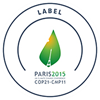The International Scientific Conference �Our Common Future under Climate Change� took place at
UNESCO and UPMC (Paris) in July 2015.
This four-day conference was the largest forum for the scientific community to come together ahead of the 21st
UNFCCC Conference of the Parties (COP21), which will be hosted by France in December 2015 (�Paris Climat 2015�). Building on the results of
IPCC 5th Assessment Report (AR5), the Conference addressed key issues concerning climate change in the broader context of global change. It offered an opportunity to discuss solutions for both mitigation and adaptation issues. The Conference also welcomed Side Events organized by different stakeholders.
The conference was organized under the umbrella of
ICSU,
Future Earth,
UNESCO and major French research institutions, with the support of the French Government.
The Conference had four overarching objectives:




